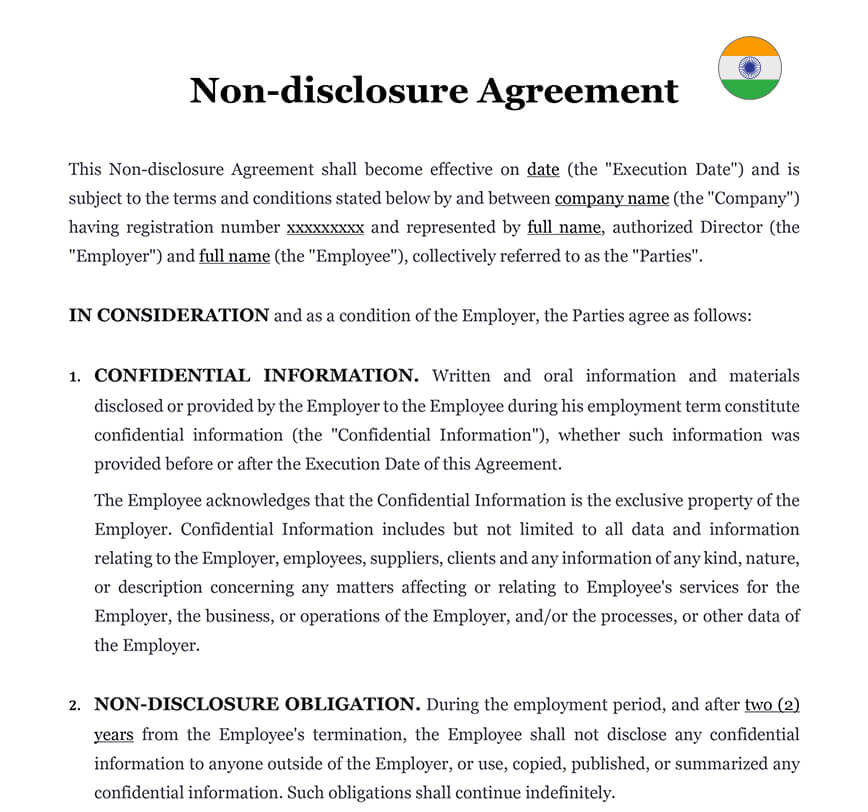Ready to use legal template
Drafted by experienced lawyers
Compliant with Indian law
Ready to use legal template
Drafted by lawyers
Compliant with Indian law
Learn more about Employee Confidentiality Agreement in India
The Employee Confidentiality Agreement allows a company to protect its confidential information against any disclosure to third parties of the company but also internally. The clause prohibits the employee from disclosing certain confidential informations related to the company’s business. In order to best protect the company, all new employees of the company must sign this model of confidentiality clause valid until three years after the end of the contract. Confidentiality clauses for employees are governed by the Contracts Act of 1872 and the Labor Law. Download our Themis Partner Confidentiality Agreement available in Word format.
Table of contents
What is an Employee Confidentiality Agreement?
In Indian civil law, it is possible to provide for an agreement or clause by which any sensitive and/or confidential information of the company can be kept secret from outsiders or within the company itself. This form of guarantee of the company’s interests is also governed by labor law, which provides for the possibility for the employer to insert a confidentiality clause when drafting the Employment Contract.
ℹ️ Consequently, this clause makes it possible to prevent any employee who has access to information and data vital to the organization and life of the company from disclosing them.
What does a Confidentiality Agreement cover?
Generally speaking, the Confidentiality Agreement covers various information and data such as the financial health of the company, its commercial policies, its clientele, its advances in research and development, its manufacturing processes, etc.
It should be noted that the confidentiality clause can be included in any type of contract, whether it is open-ended or fixed-term, part-time or full-time.
Why download this Employee Confidentiality Agreement?
As a professional, certain information can be of considerable importance to your company, such as financial data, development strategies and ideas, or any other project. Information can be a real weapon in the business world, especially with regard to competitors. It is therefore imperative to protect your company’s data through confidentiality agreements signed with your employees. They will then be subject to an obligation of discretion with regard to the information, whatever its nature.
With our confidentiality agreement template, your company’s sensitive and confidential information will be protected. It can remain the property of your company without risk of theft, unauthorized disclosure, use of information by former employees or competitors.
How to write a Non-Disclosure Agreement with your employee?
First of all, under Indian law, a confidentiality clause in a contract obliging one or more parties to keep certain information confidential, must be included in a contract in case a company is equipped with a specific idea, trade secret, process, product or concept among others.
To be valid and enforceable, the confidentiality agreement must contain certain elements. It can take any form. It can be stamped or not, and it is not mandatory to register it.
The employee’s confidentiality agreement must:
1. Mention and identify the parties to the agreement. As such, a copy of an ID and address of the parties should be inserted.
2. Define what information qualifies as confidential to the company. The next clause in the agreement will cover the definition of what falls under confidential information in the contract. Information that is not classified as confidential will be exempt from the non-disclosure obligation. Generally, information exempt from confidentiality is information already in the public domain or where it has been disclosed earlier.
3. Define the period of application of the agreement. This means setting a specific date for the end of the confidentiality obligation. The nondisclosure agreement may extend beyond the period of the employment contract. However, the period after the end of the employment contract depends on the type of industry. For example, in fast-moving industries, confidential information may become obsolete quickly, and the time period may be set at, for example, 3 to 6 months after the end of the contract. In slow-moving industries, information may remain relevant for years. As a guideline, it is best to provide for a confidentiality obligation of at least three months and no more than 24 months after the end of the employment contract, regardless of the nature and reason for termination.
4. Define the confidentiality obligation and its application in the contractual relationship. The following clause should describe the basic confidentiality obligation, in other words, not to disclose the company’s confidential information voluntarily, negligently or carelessly. Thus, it should detail the prohibited acts, such as: not taking and storing information at home unnecessarily, or storing it virtually in a laptop, hard drive or drop box; keeping documents containing confidential information etc.
To ensure that the employee respects the confidentiality of the company’s information, a penalty clause can also be added to the agreement, allowing the employer to demand significant financial compensation in case of breach of the confidentiality agreement.
5. Define the informations that are excluded from the confidentiality agreement and that can be disclosed by the employee. It is customary for confidentiality agreements to often list circumstances or situations in which an employee would be exempt from confidentiality obligations.
6. Stipulate terms relating to retention of Intellectual Property and feedback. Clauses can be included stating that intellectual property rights to information or ideas disclosed by the employer are retained by the employer. This is common in the technology sector in particular. In addition, another clause can be inserted in the contract stating that all documents containing confidential information and any derivatives must be returned to the employer upon written request by the employer.
7. State the law, the jurisdiction and the method of dispute resolution.
How to protect your confidential informations?
When drafting the confidentiality clause, care should be taken and employers are advised to do so in accordance with the criteria established by case law, i.e. by court decisions. For this purpose, Thermis partner offers you a model confidentiality agreement in full compliance.
What are the sanctions for violating the NDA?
In the case that the employee has breached the confidentiality obligation, the employer may assert a claim for dismissal for professional misconduct and contractual liability for the breach.
In the event of a breach of contract, the employer may also raise a claim for damages. This remedy may take the form of an injunction to prevent the third party from disclosing confidential information or to return it. It is also possible to open a claim for damages for the harm actually caused as a result of the breach of contract. However, in order to benefit from this, the burden of proof of the breach of contract as well as the damages caused lies with the employer, which sometimes becomes a difficult task given the nature of the confidential information.
- Remarks:
In addition and in some cases employers may also rely on provisions of the Indian Penal Code such as Section 381 for theft by clerk or employees, Section 403 for dishonest misappropriation of property and Section 405 for criminal breach of trust. These provisions may be raised in the event of the presence of a penalty clause, a wilful breach of confidentiality and malice.
Finally, the provisions of the Information Technology Act 2000, such as section 43A (compensation for failure to protect sensitive personal data or information) and the Copyright, which protects the employers’ database, are also available as a legal basis for prosecuting the employee.
SPECIAL OFFER
HR Pro
15 Document Package
Essential documents for managing employees in India
Confidentiality AgreementTemplate (.docx)
Save on attorney fees
310 client reviews (4.8/5) ⭐⭐⭐⭐⭐
Share information
Why Themis Partner ?
Make documents forhundreds of purposes
Hundreds of documents
Instant access to our entire library of documents for India.
24/7 legal support
Free legal advice from our network of qualified lawyers.
Easily customized
Editable Word documents, unlimited revisions and copies.
Legal and Reliable
Documents written by lawyers that you can use with confidence.




